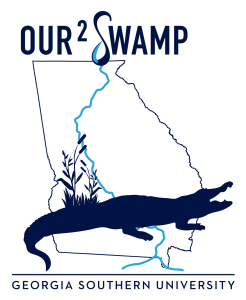Georgia Southern team awarded more than $750,000 for teacher development grant
 A team of Georgia Southern University professors led by College of Education’s (COE) Lacey Huffling, Ph.D., has been awarded a $763,897 grant from the Gulf Research Program (GRP) of the National Academies of Sciences, Engineering and Medicine (under award number 2000009821).
A team of Georgia Southern University professors led by College of Education’s (COE) Lacey Huffling, Ph.D., has been awarded a $763,897 grant from the Gulf Research Program (GRP) of the National Academies of Sciences, Engineering and Medicine (under award number 2000009821).
The grant will fund the first two years of Okefenokee — Understanding Real-world Relevance through Suwannee Watershed Assessment and Monitoring Project (OUR2 SWAMP). Created by Huffling and her colleagues, the project will offer a summer on-site learning experience at the Okefenokee Swamp in Georgia as well as continued professional development for both in-service and pre-service teachers.
The project aims to increase Georgia middle and high school students’ understanding of the impact their local watersheds have on larger bodies of water. The project will focus on the causal relationships between the Okefenokee Swamp and the Gulf of Mexico, allowing teachers to integrate what they learn into their classrooms and promote community awareness of local waterways.
“The Okefenokee is a very unique ecosystem,” said middle grades and secondary education science faculty Heather Scott, Ed.D. “It is a great place to talk about freshwater quality and how that impacts not just all the creatures and organisms that are present in the swamp, but as it drains from there the impact it has as well.”
Other Georgia Southern grant team members include Checo Colon-Gaud, Ph.D., biology faculty; Shainaz Landge, Ph.D., chemistry faculty; and the Institute of Interdisciplinary STEM Education Coordinator Kania Greer, Ed.D., who serves as the grant evaluator.
In summer 2019, up to 20 teachers and 10 current Georgia Southern education majors will have the opportunity to visit and study the Okefenokee Swamp. The following summer, up to 30 teachers and 10 students will partake, including some participants from year one to help serve as facilitators and guides for the new participants.
“Our goal for the summer development is for the teachers to determine what they would like to study in their own schoolyards, something in their local ecosystem that they want to focus on,” Huffling said. “If they are not near a stream, they may look at birds, pollinators, plants or insects. There are so many different citizen science projects they can do, and we want the teachers to help us design and develop what the week will look like. We want it to be something they need and can envision using in their classrooms.”
After completing a week of hands-on activities and developing curriculum in the summer, Huffling and Scott will continue to support the educators by conducting site visits at their schools, hosting web conferencing and encouraging collaborative engagement on a blog-style website for the next year.
“A key component to this project is the follow-up,” Huffling said. “It is hard to develop a project like this if they do not have some form of support. The team plans to be that support throughout the year, but the teachers will network and support each other as well.”
The idea for OUR2 SWAMP grew out of a previous Teacher Quality Grant program that Scott and Missy Bennett, Ed.D., emeritus professor of science education, coordinated for several years. The project began in the Okefenokee Swamp but moved to the coast after the swamp burned in 2011. Scott and Bennett, who will serve as a consultant on the grant, saw a positive impact on teachers over several successful years of studying the swamp and coastal ecology.
“I had one teacher who told me that the experience she had that summer saved her teaching career,” Scott said. “She was considering leaving. This project is a neat way to build connections with other teachers and professionals and continue to grow and rejuvenate yourself in your teaching career.”
Participating teachers will receive a stipend and classroom supplies, and students will attend the weeklong development at no charge. Both the North Georgia and Okefenokee Regional Educational Service Agencies wrote letters of support for the grant and will be loaning classroom supply kids for teachers as well.
“I love that the National Academies of Sciences, Engineering and Medicine are honoring the fact that teachers deserve compensation for getting more professional development and the classroom supplies to implement it,” Huffling said. “If we are going to grow teachers and advance, we need to realize that teachers are professionals and they should be compensated, and that was one of the vital components in writing this grant.”
Huffling says work on the project has already begun, and they are already speaking to teachers and recruiting participants for next summer.
“We dreamed big,” she said. “We have a big vision, but we have a good team to do it, and we are excited to partner with teachers to help that vision come true.”
This content is solely the responsibility of the authors and does not necessarily represent the official views of the Gulf Research Program or the National Academies of Sciences, Engineering, and Medicine.
Georgia Southern University, a public Carnegie Doctoral/Research institution founded in 1906, offers 141 degree programs serving nearly 26,500 students through nine colleges on three campuses in Statesboro, Savannah, Hinesville and online instruction. A leader in higher education in southeast Georgia, the University provides a diverse student population with expert faculty, world-class scholarship and hands-on learning opportunities. Georgia Southern creates lifelong learners who serve as responsible scholars, leaders and stewards in their communities. Visit GeorgiaSouthern.edu.
Posted in Press Releases, University Homepage

